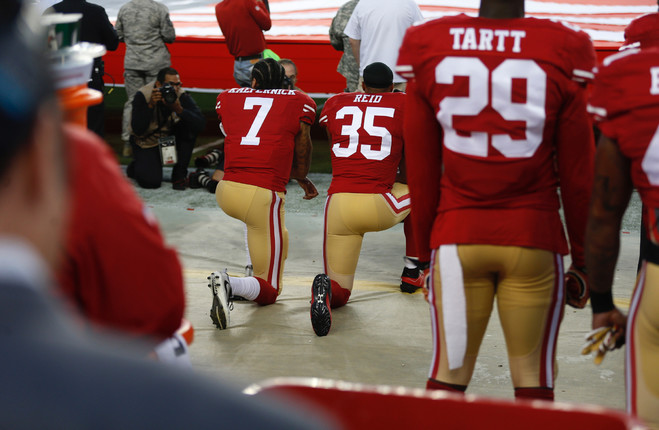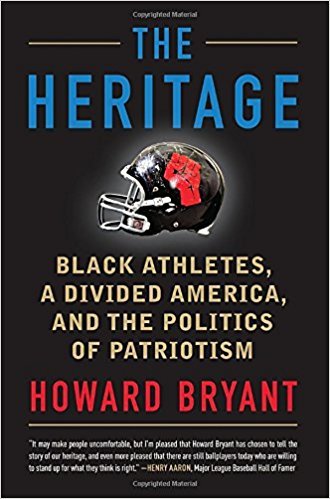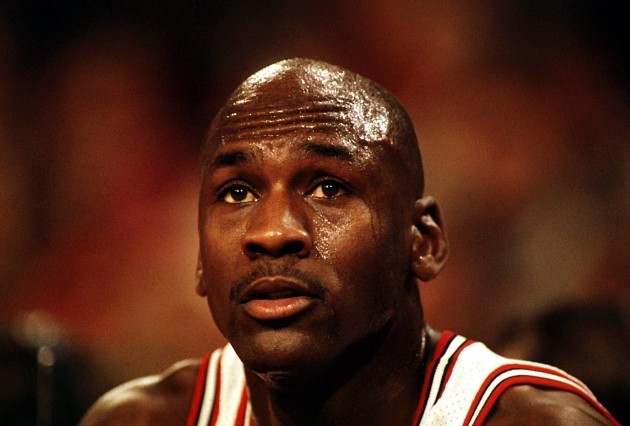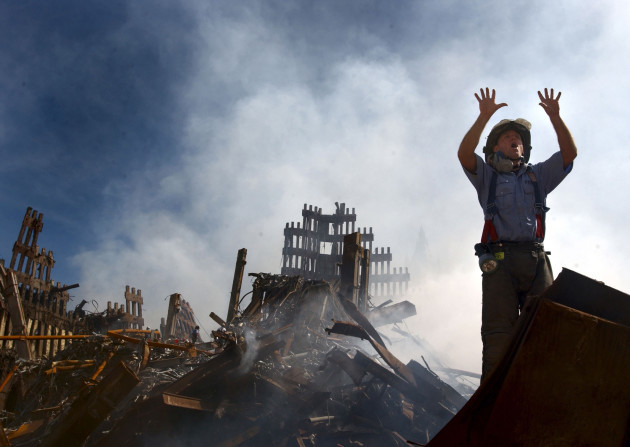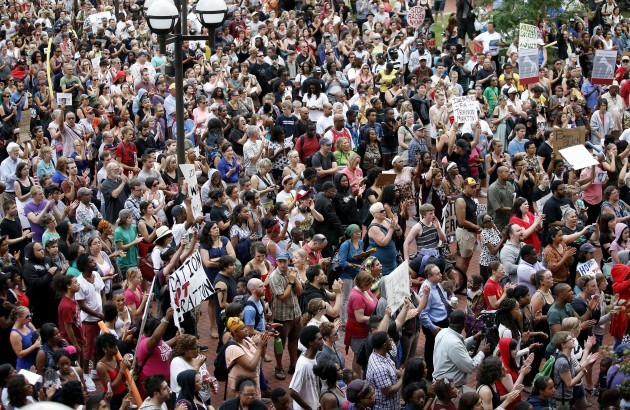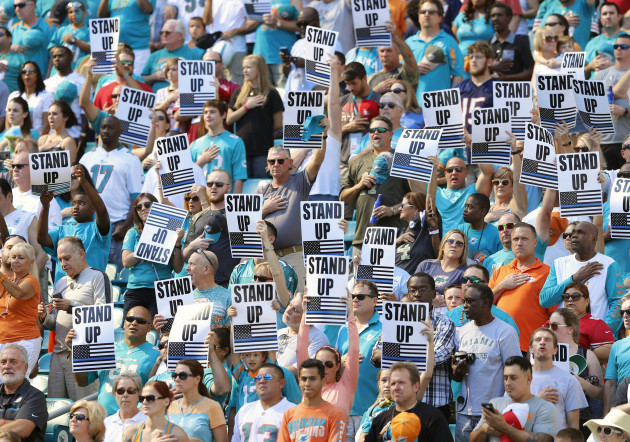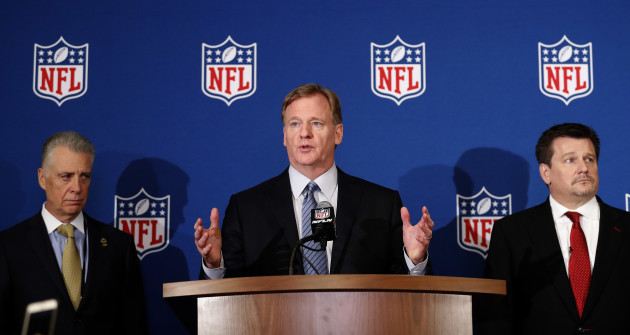“I DON’T THINK people should be staying in the locker rooms. . . . You have to stand proudly for the national anthem, or you shouldn’t be playing, you shouldn’t be there. Maybe you shouldn’t be in the country. You have to stand proudly for the national anthem.”
- Donald Trump, 45th President of the United States of America, 24 May 2018
If the National Football League thought they would keep everyone happy by drawing up proposals that will remove the requirement for all players to be on the field during the playing of the US national anthem — telling players who do not wish to stand they can stay in the dressing room — they could not have been more mistaken.
The reaction from the players’ union was definitive. The ‘management’ of protests is something that should form part of any collective bargaining agreement and not be decided upon unilaterally by the owners.
While the reaction from Trump — who called players ‘sons of bitches’ in 2017 for protesting — was to push for even further sanctions, suggesting on Fox and Friends that enforced patriotism is the only solution.
Unsurprisingly, in trying to please everyone, the NFL has found itself with the worst of both worlds; a president who feels emboldened enough to threaten to deport people for a lack of patriotism and a players’ body more determined than ever to draw attention to racial or social injustice.
“Did they really think they were going to satisfy this man?” Howard Bryant asked The42 yesterday when Trump’s comments were mentioned.
Bryant — a senior writer with ESPN, National Public Radio correspondent and prolific author — has recently published ‘The Heritage: Black Athletes, a Divided America, and the Politics of Patriotism.’
As the title suggests, the book takes an in-depth look at the history of black athletes protesting social and racial issues, so Bryant is well placed to outline how NFL players might react to this week’s developments.
“I don’t think the players are going to strike because they didn’t before. If the players weren’t willing to strike over all these years — they haven’t had one since 1987 — I doubt they’re going to strike over this.
“What you are going to see is a hardening of the line though. You’re going to see that this is not a patriotism issue, this is a labour issue. And because it’s a labour issue, you’re going to see the relationship between management and labour only deteriorate further.
“We’re going to find out what the players are made of. I think they made a huge tactical mistake in agreeing to their settlement with the owners. These owners are their adversaries and I think we’ll start seeing a more adversarial relationship.
“I also see something else. This decision by the owners was also a direct challenge to black consumers. How will black consumers respond to the NFL when clearly this message says that their feelings about the relationship between the police and the community is not being taken into account. They’re being told to obey and watch the game.
“We’ll see what the black consumer does. But all this new policy did was further the animosity and further the dividing lines that were already sharp in this country and I think things are clearly going to be worse and more divisive before they get better.”
Like the current state of music, your view on protesting athletes is likely shaped by your age. If you’re old enough to remember Tommie Smith and John Carlos making their Black Power salute at the 1968 Olympic Games, you’re likely comfortable with the idea of athletes using their profile to further social causes.
If you grew up trying to dunk like Michael Jordan or drive the ball like Tiger Woods, the actions of Colin Kaepernick or Eric Reid is likely to raise an eyebrow or two.
“The Heritage is about the lineage of political activism by African-American athletes that really does go back 100 years. It goes back, you could argue, to Jack Johnson but for me it started with Paul Robeson. And from him to Jesse Owen and Jackie Robinson, Hank Aaron and Muhammad Ali and all of the athletes who felt an obligation to involve themselves in political and social activism.
What’s interesting about the lineage is that, if you’re of a certain generation, this is completely uncontroversial. If you were born in the 1950s or the 1960s, you were very much aware of Smith and Carlos and the fact that African-American athletes did get involved with political issues.
“But if you were born in the late 1970s, 1980s and certainly the 1990s, the idea of seeing any athlete — but especially a black athlete — getting involved politically is completely foreign to you.
“Michael Jordan, Tiger Woods, OJ Simpson — before he had other issues, obviously — but all of those athletes had a different legacy, a four-decade legacy of athletes not getting involved.
“It means the revival is welcome if you’re of one generation, but surprising if you’re of another.
“For Michael and Tiger, they worked for the advancement of the corporation, the greater good was Nike.
“For me, it’s really interesting because I always talk about professional sports in the United States as having three waves.
“The first wave is the immigrant story. If you go back to the turn of the 20th century, sports was a way for immigrants coming from the old world to become American; to become less Italian, less Irish, less Spanish, less French through sport.
“Whether it was Babe Ruth or Honus Wagner for the Germans or Joe DiMaggio for the Italians or Lefty O’Doul or Jack Dempsey for the Irish, you used sport to become American.
“The second wave was the integration story. Through sports, you began to see the civil rights movement. Let’s not forget that baseball integrated before every major institution in the United States, even before the army.
“The third wave of this story is the economic story, the money story. That’s where the corporations began to take over, where the money was enormous and the athletes were no longer going to public schools. They were on a trajectory towards becoming super rich.
So when you have this stage of the evolution, of course some athletes are going to be completely risk averse because they don’t want to jeopardise what they have.
“When you have money, people listen to you, they want you to speak because you have money. Who do we listen to most in the western world, we listen to the rich people… except the rich black athlete. I would say black people but Oprah Winfrey is incredibly rich and people want her to run for president.
“But yet, if you play sport, they want you to be quiet, to shut up and dribble.
“It’s not just the fact they want you to shut up and dribble, it’s also the fact that — because of the economic situation of African-Americans and African-American communities — the entire community wants you to speak up otherwise they’ll criticise you heavily for forgetting where you came from and all of that rhetoric.
“No matter how many Majors Tiger Woods wins, no matter how many times we say that Michael Jordan is so much better than LeBron James — even though he’s not — what do we talk about? We still have that little asterisk asking what did Michael do with his platform? That never goes away.”
For Bryant, the moment sport changed in the United States was when American Airlines Flight 11 was crashed into the north tower of the World Trade Centre at 8.46am on 11 September 2001.
“People invest a huge amount of time talking about the black athlete and the black athlete’s historical burden but what we miss is where we are today.
“Where we are today is in a post 9/11 society where any sort of challenge to authority is taken as being unpatriotic. Any sort of dissent in America is taken as being, not just unpatriotic, but disrespectful to the military. I always try to caution people and remind them that it’s okay to criticise the military if you don’t like what they’re doing. You’re not supposed to go to jail for these things.
“The other thing is that we live in a period, post-Ronald Regan, of being completely anti-labour in this country. We have given all of the power to management. How many times do you hear or read someone saying ‘if I did that in my job I’d get fired?’ And how many times do you hear that the owners are the bosses and can do whatever they want?
“But that’s not true, that’s why we have labour laws. Over the past 40 years, however, everything has been given to the employer and that’s why, even people who would benefit from a LeBron James or Dwayne Wade or whoever taking a politically active stance to help them, those people still ignore that because we’re in such an anti-labour mode in this country.
“A lot of that is because of fear, there’s no other word for it. 11 September 2001 — when those towers fell and I was living in Manhattan at that time — it changed everything. I was born in the 1960s so my world, as a kid, was shaped by the Cold War. We were afraid of the Russians, of nuclear war, that’s my generation.
“This generation is all terrorism. If you were born in 1990, you were 11 years old for 9/11 and you’ve never seen sports not looking like this. You don’t remember that there wasn’t always a flag the size of the 50-yard line across every football field.
This is your reality but a separate reality comes with that. That reality is that the military and the police are now embedded into sport and it’s normal. But it’s not normal, it’s become the abnormal normal.
“But why are we doing this? Especially when we know that none of this is legitimate anyway because the Department of Defence is in collusion with the sports league and paying for these displays of patriotism. They’re not organic, these are business transactions. Yet, what’s very interesting about being in this country post-9/11 is that people know this and still don’t care.
“They view it as a harmless deception but my counter to that has always been, if it’s so organic and so legitimate and so important… why do you have to deceive the public? Why is the Wisconsin National Guard paying $49,000 to the Milwaukee Brewers to sing ‘God Bless America’?
“Why are the New England Patriots taking €125,000 to stage induction ceremonies at a football game when the argument, to the black athletes, has been keep politics out of sport? You can’t have it both ways, but they try to.
“Since 9/11, especially in football, there’s always been this nexus between the military and the game. It’s always been hyperbolic and nonsensical to me but it’s how they sell the game. War terminology is part of football, but 9/11 was when the commercialisation of it began.
9/11 was where the sports leagues recognised there was profit to be made in selling patriotism.
“Previously, sports leagues didn’t want to go anywhere near political or controversial subjects because you didn’t want to anger half of your fan base with half being Democrat, half being Republican. They didn’t really want to risk it.
“But 9/11 was a unifying moment. After 9/11 there was no risk to getting involved with the police or military because who doesn’t want to fight terrorism? So there was this feeling that you could cash in and, over the past 17 years, it has become really insulting in a lot of ways.
“If you speak to military veterans who don’t have services or jobs or the things they need after fighting in combat; to see billionaires profiting off of their service and off of their injuries, it’s not something the public are too familiar with or that veterans themselves are too pleased with.”
The spark for the most recent wave of protests from black athletes is the extrajudicial killing of young black citizens, sometimes by the police forces charged with serving and protecting them.
Tamir Rice, Trayvon Martin, Eric Garner. It is their deaths that Colin Kaepernick and his fellow players are protesting. Not an anthem. Not a flag.
“That is definitely the fulcrum,” says Bryant.
“That is the collision that you’re seeing now in sports because the conflation taking place right now is very stark. Because of 9/11 — and once again that event is the tipping point, it’s the demarcating line — because we lost so many police and members of the port authority that day. After that you had the militarisation of sports — not to mention the country fighting two wars — and people began to conflate the military and the police.
“But they’re not the same thing.
“Now they get treated under the same umbrella as first responders. So whether you’re fire, army, navy or police, you now get to be treated as an international hero. You are part of the War On Terror. You are part of the post-9/11 recovery of the United States.
“There’s only one problem. That problem is that the relationship between the police and their fellow Americans in black communities across the country, that’s not a heroic relationship, it’s a very contentious relationship.
That’s where you see the re-awaking of the protesting black athlete. It’s not from the military, not from war, not from the environment but from the relationship between the police and the black community, especially with these shootings we’ve seen over the past six or seven years.”
Bryant says that those arguing that kneeling during the anthem is disrespectful would argue against any sort of protest and that if you argue for method over reason then you’re part of the problem.
“If you’re more outraged by kneeling during the national anthem before a game where 22 guys are going to smash into each other for four hours than the police shooting an unarmed citizen, then you’re part of the problem.
“There’s no way to protest that makes people happy. That’s what protest is. Look at any protest, do you see people smiling? The protesters aren’t smiling, they would rather not be there. Most people reach this point because they have nowhere else to go in terms of trying to work with the system, so they’re working outside of the system.
“I try to tell people all of the time — because they like to distort history, they like to distort Jackie Robinson and Martin Luther King Jr. They all talk about MLK, the great unifying, saintly, MLK. But Martin Luther King’s approval rating in the 1960s were in the low-30s.
He was one of the most hated people in the country until they shot him. After they shot him, now all of a sudden he mattered and all of a sudden he was important.
“But let’s not distort the history. Go online and look at the polls charting his popularity. He was one of the most unpopular people in the country and all people did to this great non-violent man was question his methods.
“When people talk about protest, they seem to think that all of this is bloodless, but it’s not bloodless. If you end up in the street, you’re there for a reason and the reason is that you’ve reached your breaking point.
“And you’re also there because the people that you’re protesting have also decided that they’re not going to work with you. That’s what happens and it seems like we all try to act as if there’s a different way to talk through it and hug it out. But it doesn’t work that way, there’s no historical model.
“Things change when people fight, that’s how it works.”
But does Bryant see any solution to the current impasse where athletes are being told to shut up and play and fans to shut up and watch?
“The path is to stop being so nice. It’s obvious that Donald Trump wants one thing and that’s obedience. It’s also true the owners want one thing and that’s a powerless workforce.
“So what is the labour going to do?
“Is labour going to capitulate and you get peace through compliance? Or are we going to get peace through respect with the players fighting for what is theirs and reach an accommodation where we have balance.
“NFL players have some serious decisions that they have to make. They are treated like children in many ways because they act like children. They don’t demand anything and do what they’re told and become incredibly rich for doing so.
“But they’re being challenged right now, these great warriors who put their bodies and their health and their futures on the line to score points or prevent points.
“Now they’re being challenged by management to a fight they haven’t really been willing to wage for a very long time. Let’s see what they do.”
The42 is on Instagram! Tap the button below on your phone to follow us!
